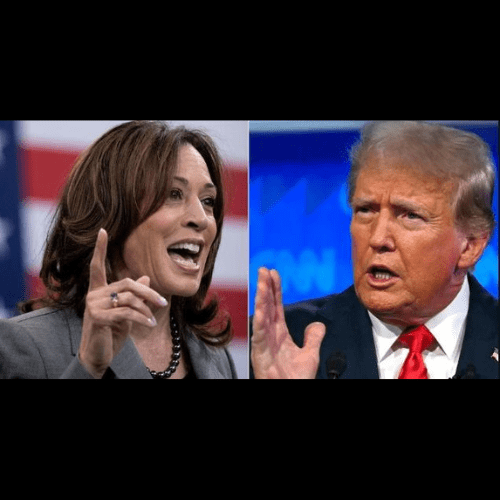As Vice President Kamala Harris and former President Donald Trump approach the final hours of the 2024 presidential election, the race remains intensely competitive, with both national polls and electoral map projections indicating a close contest. Beyond political implications, the election outcome could have significant effects on the U.S. stock market. Financial analysts are divided on how the market will respond, with each candidate presenting a distinct set of economic priorities that could drive investor sentiment in contrasting directions.
This analysis breaks down the current polling and likely electoral outcomes, then explores how each candidate’s policies might impact sectors such as technology, energy, healthcare, and financials.
National Polling, Swing States, and Market Sensitivity
National polls show Kamala Harris holding a slight edge over Donald Trump, but given the importance of the Electoral College and tight margins in critical states, this lead doesn’t ensure a Harris victory. Key battlegrounds—Pennsylvania, Michigan, and Wisconsin—are experiencing intense campaign activity, as these states will likely determine the election outcome. However, financial markets are particularly attentive to potential policy shifts based on which candidate emerges victorious.
Market Implications of a Harris Victory
A Harris presidency could drive certain market sectors forward while creating volatility in others. With an agenda focused on green energy, healthcare reform, and social policy initiatives, Harris is likely to push for expanded investments in sustainable technology and renewable energy. Here’s how some sectors could respond under a Harris administration:
Green Energy and Technology: Renewable energy companies, electric vehicle (EV) manufacturers, and technology firms specializing in energy-efficient products may experience stock price gains. Harris’s climate policies, including tax credits for clean energy, would support green technology and infrastructure, potentially benefiting companies like Tesla, NextEra Energy, and those involved in solar and wind energy. This could draw investor interest away from fossil fuel companies while bolstering firms involved in emissions reduction technologies.
Healthcare Sector: Harris has advocated for strengthening healthcare access, including possibly expanding the Affordable Care Act. This could create demand for companies in pharmaceuticals and medical devices. However, companies within private health insurance and those wary of further regulation may see stock declines as a Harris administration might increase oversight and lower drug prices. Firms in biopharmaceuticals that align with healthcare reform priorities, such as telemedicine providers, could be poised for growth.
Technology and Regulation: Big tech firms could face new challenges under Harris’s leadership. While the sector might benefit from the administration’s digital infrastructure initiatives, Harris’s regulatory approach may increase scrutiny on data privacy and antitrust actions, especially for dominant players like Amazon, Google, and Meta. This could create a mixed environment for tech stocks, balancing growth with regulatory risks.
Infrastructure and Construction: With Harris’s commitment to rebuilding infrastructure with a focus on sustainability, construction, engineering, and materials firms could see stock increases, particularly those involved in green construction and transit.
Market Implications of a Trump Victory
A Trump win is expected to create a different market environment, focusing on deregulation, energy independence, and tax cuts for businesses. Here’s how a second Trump term could affect various sectors:
Energy and Fossil Fuels: Trump’s pro-fossil fuel stance would likely boost the stock prices of traditional energy companies. His administration would likely continue to advocate for deregulation of oil and gas industries, bolstering energy firms and potentially driving down fuel costs, benefiting companies like ExxonMobil and Chevron. Renewable energy companies, however, might see reduced federal support, potentially slowing their stock growth compared to a Harris administration.
Financial Services: Trump’s emphasis on deregulation and business tax cuts would likely benefit financial services, banks, and corporations more broadly. The financial sector often responds positively to policies that reduce regulatory burdens, and a continuation of Trump’s policies may result in further appreciation in bank and financial stocks.
Healthcare and Pharmaceuticals: Trump’s health policies emphasize reducing regulatory oversight, particularly concerning drug pricing. This approach could benefit pharmaceutical companies and medical device manufacturers. However, uncertainty may persist for healthcare stocks related to insurance and federal healthcare programs if further deregulation destabilizes the Affordable Care Act without a clear alternative in place.
Defense and Manufacturing: Trump’s emphasis on national security and bolstering the U.S. manufacturing sector could result in gains for defense and aerospace firms, as well as companies involved in industrial manufacturing. A strong focus on “Made in America” policies would likely encourage growth in these sectors, benefiting firms with U.S.-based production and supply chains.
Immediate Market Reactions: Volatility or Stability?
Regardless of who wins, market volatility is anticipated in the immediate aftermath of the election. In the event of a Harris victory, markets may respond positively to the clarity of new green energy policies and infrastructure spending initiatives, though potential regulatory impacts on technology and finance could create temporary market hesitancy. Should Trump win, markets might initially rally, driven by the prospect of continued deregulation and tax cuts. However, Trump’s more isolationist trade policies could lead to long-term volatility, particularly in sectors dependent on international trade.
Election Night Scenarios and Market Sensitivity
If the election results are close or contested, as some analysts predict, uncertainty could drive short-term market declines. Prolonged uncertainty or legal battles over contested results, particularly in crucial swing states, could create risk-averse sentiment, with stocks likely falling temporarily as investors seek safer assets like gold or U.S. Treasuries.
Decisive Harris Win: A clear win for Harris could lead to a rally in renewable energy, healthcare, and tech stocks focusing on climate and infrastructure innovations. Financial services may experience mixed reactions, especially if increased regulatory scrutiny seems likely.
Decisive Trump Win: A decisive Trump victory may drive immediate market gains in the energy and financial sectors due to anticipated deregulation. Market confidence might increase short-term, with high returns expected in traditional energy and financial services. However, tech giants might face less regulatory pressure, boosting their stocks alongside defense and manufacturing sectors.
Contested Election: In the event of a drawn-out legal battle or narrow vote margins in key states, markets could experience volatility and declines, especially if the uncertainty stretches for several days. A contested result, with potential recounts in states like Pennsylvania, Arizona, or Georgia, could cause market anxiety as investors weigh the impact of political gridlock.
Conclusion: Election Outcomes and the Stock Market
In the final hours of the 2024 race, both candidates represent starkly different market outlooks, underscoring the election’s significance beyond politics and into economic and financial sectors. Harris’s potential presidency could steer the U.S. toward green energy and healthcare reform, appealing to tech and renewable sectors. Trump, in contrast, offers a pro-business and deregulation-focused agenda that may stabilize traditional energy and financial markets while maintaining existing tax structures.
As Election Day nears, the focus on Pennsylvania, Michigan, Wisconsin, and other battleground states remains critical, as these outcomes will directly influence the country’s economic trajectory and investor confidence. A Harris win could drive forward-looking gains in renewables and healthcare but bring regulatory concerns for some industries, while a Trump win would likely stabilize fossil fuels and financial services. With the stakes high, the stock market’s reaction will serve as a barometer for investor sentiment in the wake of America’s choice on November 5, 2024.
by Steve Macalbry
Senior Editor,
BestGrowthStocks.Com







